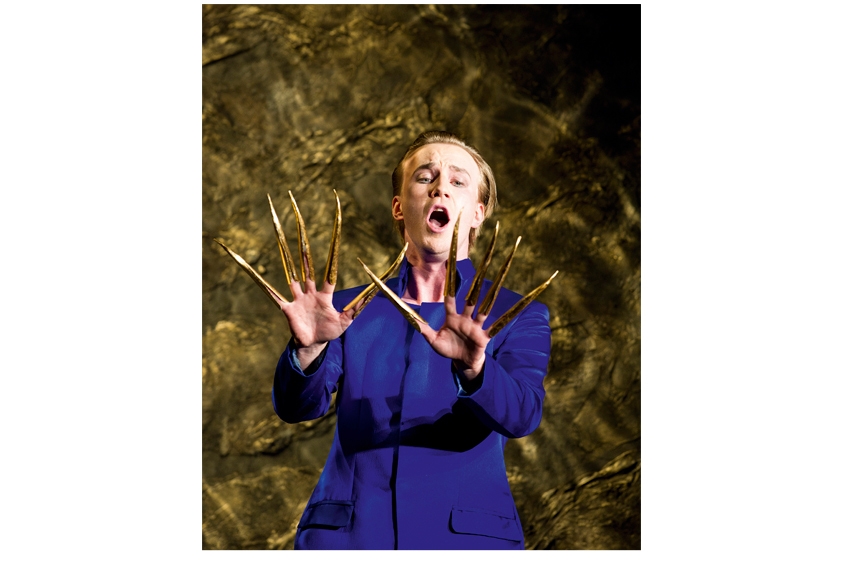Giulio Cesare was the first of Handel’s operas to return to general favour after more than a century and a half of neglect, and I suppose that it is still the most frequently performed. That isn’t surprising, since its plot is, by Handelian standards, simplicity itself, and the level of inspiration in the arias is astonishingly high. There is a problem with it, at least in the UK at the moment, and that is that David McVicar’s Glyndebourne production of 2005 has been so widely and wildly acclaimed, and distributed, that new productions are bound to be seen in its shadow. As one of the very few people who thought that McVicar committed an act of treachery with regard to Cesare, I looked forward to Tim Albery’s new production for Opera North with high hopes, which were partially fulfilled.
It shouldn’t be a problem that Cesare alternates or mixes pathos and comedy with unusual thoroughness. The trouble is that most dramatic works don’t. Handel and his librettist Haym achieve in Cesare a balanced look at heroism, erotic love, friendship, betrayal, ambition and vengeance which hardly has its equal outside the writings of Samuel Johnson, Handel’s near-contemporary — and what an incomparable commentator he would have been on Cesare if he had had the least appreciation of music! McVicar turned the opera into a mere romp, so that, for instance, Cleopatra’s heart-breaking arias of bereavement and desolation were reduced to petulance and foot-stamping frustration. Albery has steered well clear of that crassness, but he hasn’t found anything much in the work, not nearly as much as I had expected and as is surely there waiting to be presented and explored. The opera, in Leeds, left a strangely neutral impression, as though a vivid oil painting had been tastefully reproduced as a watercolour.
The sets promised something, though it wasn’t obvious what. To begin with we had a side of a pyramid, with a door in it, grim and grey. That was pushed round later to reveal a gaudy but obscure interior, with random flashes of light: baffling. Costumes, as one takes for granted, are contemporary. So the piece is given little atmosphere, and the performers have to establish not only character but also rank, relationship, and so on. Not all of them did.
The opera has two main interconnected plots, the first that of the affair between Cesare and Cleopatra, the second that of the murdered and desecrated Pompeo’s widow Cornelia and son Sesto, striving both to stay alive and to avenge the treatment Tolomeo meted out to Pompeo.
On the first night of this production the latter plot was much more engaging than the former, mainly because Kathryn Rudge, who plays Sesto, was so moving, so passionate and sang with such forthright ardour. Ann Taylor as his mother Cornelia wasn’t far behind, and their scenes possessed an intensity that would be a credit to any production of this opera. Meanwhile the Cleopatra of Sarah Tynan was energetic and, in her lamenting arias, touching, but had less mischief in her character than Handel endowed her with; while the Cesare of Pamela Helen Stephen failed to impress much on any level. Her singing is adequate, but the outsize personality of the conqueror remains completely unrealised. James Laing made a decent shot at the jagged music of Tolomeo, and managed a fair proportion of the character’s viciousness — but it would all have been better if the performers had interacted, as is possible even in da capo arias. The orchestral accompaniment is lean, Robert Howarth’s conducting unobtrusive; but everything needs a surge of adrenaline.
The Royal Opera took its Meistersinger to Symphony Hall Birmingham for one concert performance. Bryn Terfel was to have taken over the role of Hans Sachs, but not wholly unexpectedly cancelled, so Wolfgang Koch, who sang in the London performances, sang there, too, and was transformed from the first night at Covent Garden. He sang out fully from the start, and was tireless, and wholly engaged. Simon O’Neill, who had bleated on the first night, and was clearly unwell in the broadcast, made a far more plausible Walther than I dared to expect, opening out superbly in the climactic Prize Song. And Peter Coleman-Wright’s Beckmesser was a classic study in insecurity and anxiety. Emma Bell is the best Eva we have seen and heard in the UK for years, and Heather Shipp a characterful and winning Magdalene. Toby Spence more or less took over the show as David, but his portrayal is so acute, and so well sung, that it was hard to mind.
The chorus and orchestra were fabulous. I am not yet convinced that Sir Antonio Pappano has the long line for Wagner, but almost every individual section — if one can talk in such terms of this work — was alive and well. This was the first of a series of Wagner performances at Symphony Hall over the next few months, and if the rest of the performances are as powerful as this was, it will have been a great early celebration of Wagner’s bicentenary year.






Comments